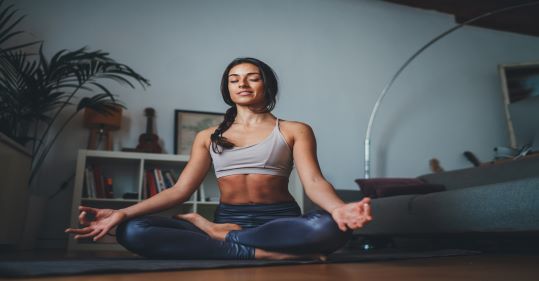Here's what a typical weekday looks like for a majority of us: we wake up, get ready in a rush, traverse the noisy and merciless traffic to reach our workplace. Then, work till evening to finish the pile of work put on our desks, battle the punishing traffic yet again, only to reach tired and stressed at home, scroll through our social media feed, probably watch a how on TV or our laptops, and ultimately, try to go to sleep, with our minds still racing from the day's stresses.
Today’s day and age does not readily give us the time to pause, slow down, and truly connect with our own selves. So, let’s take charge and do this ourselves! Meditation is a beautifully rewarding way to calm your mind, get in touch with how you are truly feeling, resolve your anxiety, and improve your emotional health..the benefits are endless! Even meditation for as little as fifteen minutes a day has been shown to reduce stress, improve concentration and enhance emotional health. In a day where we spend most of our time working for others, I am sure we can take out ten very rewarding minutes for ourselves!
Benefits of meditation:
1. Reduces anxiety and stress: Many research studies have been conducted which demonstrate the positive effect of daily meditation on reducing anxiety related symptoms such as social anxiety and phobias. Studies have also shown an effect of meditation on reducing stress levels, and symptoms of stress related conditions such as irritable bowel syndrome, PTSD (Post traumatic stress disorder).

2. Improves concentration: Several types of meditation may build your ability to redirect and maintain attention. As little as four days of meditation may have an effect, so you wil be able to reap the benefits of this beneficial habit very soon.
3. Enhances self awareness: Some forms of meditation can also lead to an improved self-image and more positive outlook on life. Two studies of mindfulness meditation found decreased depression in over 4,600 adults.

4. Sharpens memory: The improved focus you can gain through regular meditation may increase memory and mental clarity. These benefits can help fight age-related memory loss and dementia.
5. Improves sleep: A variety of meditation techniques can help you relax and control the "runaway" thoughts that can interfere with sleep. This can shorten the time it takes to fall asleep and increase sleep quality.
6. Reduce pain: Meditation can diminish the perception of pain in the brain. This may help treat chronic pain when used as a supplement to medical care or physical therapy.
Here is a step by step guide to start your meditation practice - don’t worry if you’ve never done this before - that’s what we are here for - to help you get into the habit!
- Find a conducive space: Find a nice, quiet place where you won’t be disturbed for fifteen minutes or longer.
- How to sit: You can sit on the floor cross-legged with the support of a meditation cushion, or on any chair with your feet resting on the ground, if you’re not comfortable sitting cross legged - there’s no shame in it. Just be sure to sit away from the back of the chair and place your feet firmly on the floor, aligned with your hips and knees. Regardless of how you sit, it is important to maintain the natural curve of your back.
- Body posture: Sit down, relax and rest your hands on your lap, palms facing upwards.Let the muscles in your shoulder and back relax. Your shoulders can be pushed slightly back. This establishes a strong back while opening up the front body. Keep your spine elongated so that you do not slouch, but not tensed either. The head is leaning slightly forward, with your chin tilting downwards and relaxed.
- Breathe slowly and deeply: Close your eyes gently. Direct your soft, unfocused gaze downwards. Begin by taking a few slow and deep breaths — inhaling and exhaling through your nose. Don’t force your breathing; let it come naturally. The first few intakes of air are likely to be shallow, but as you allow more air to fill your lungs each time, your breaths will gradually become deeper and fuller. Take as long as you need to breathe slowly and deeply
- Be aware: When you are breathing deeply, you will begin to feel calmer and more relaxed. That is a good sign. Now, focus your attention on your breathing. Be aware of each breath that you take in through your nose. Be mindful of each breath that you exhale. Continue focusing on your breaths for as long as you like.
- Try to focus, but it’s okay if you can’t at first: For the first few (or even more) times you meditate, your mind will wander, and that’s okay!You’re just starting out, and it is normal to take some time to focus and tune ut the things that have been on your mind. When you notice your mind wandering, smile, and simply gently return to your breath. Don’t be disheartened. What’s important is to realize that you have wandered and bring your attention back to where it should be. As you develop greater focus power, you will find it easier to concentrate.
- Ending the session: When you are ready to end the session, open your eyes and stand up slowly. Stretch yourself and extend your increased awareness to your next activities.Congratulations on starting out on this healing and helpful path!

With so many benefits - physical, mental and emotional - it is little wonder that meditation is highly recommended as a lifelong habit to get in touch with your inner world and constantly improve our own selves. Start off with meditating for ten minutes day, and keep adding a couple of minutes as you feel more and more comfortable. We can’t wait for you to begin - Don’t forget to share your experiences with us - we would love to hear them!










